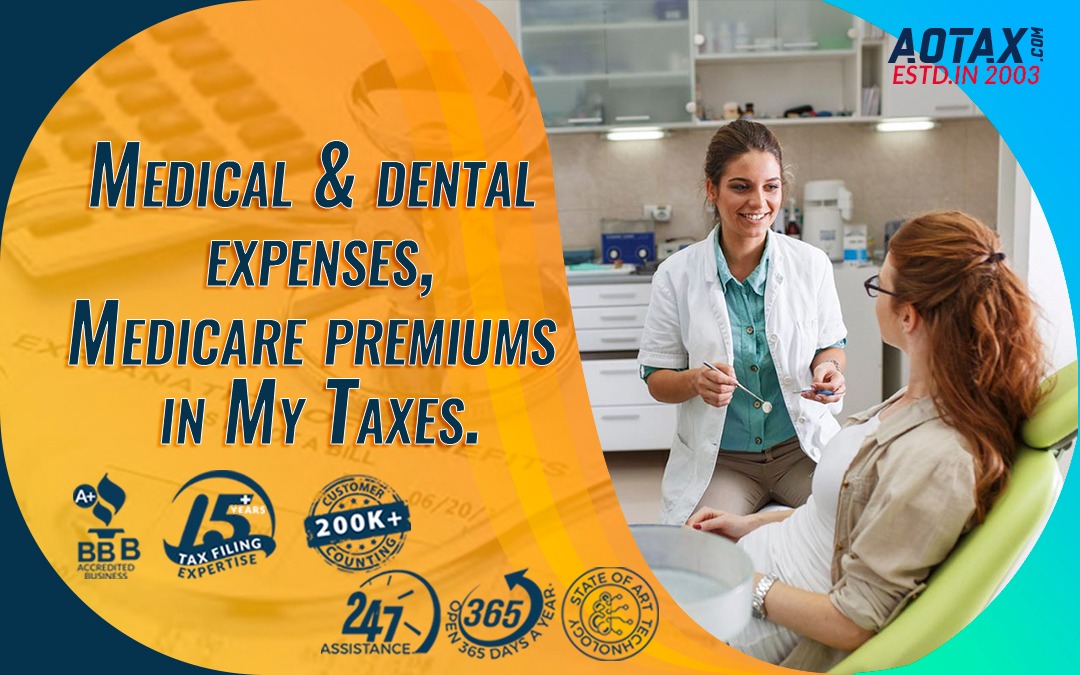Medical & Dental Expenses,
Medicare Premiums in My Taxes
Well, it would be a bit of a stretch to say that most of us don’t want to pay taxes. However, who wouldn’t take a tax deduction if it is available? For all those individuals who are looking out for different ways by which they can reduce their tax liability, here is one effective method of doing so. You can include your Medicare premiums and even dental expenses in tax filing for better deductions. Sure, there are some prerequisites and details that one must consider and they are below.
Deducting Medicare Premiums
A brief look at the regulations and conditions set by IRS and you will quickly understand that you can deduct your Medicare premiums. If you itemize your Form 1040 and list out Medicare premiums and meet certain criterion, it is yours for the taking. The IRS has a clause under which you can easily deduct the premium amount paid for Medicare if it exceeds 10% of your AGI (Adjusted Gross Income). For an example, if your AGI is $20,000 then 10% of it would be $2000. If your Medicare premiums are more than $1500, you can add them as a deductible. The same would be reduced to $1500 or 7.5% of the AGI if the age of the tax payer is more than 65 years old.
Can I include Medical and Dental Expenses?
The short answer is yes you can. In fact, the IRS clubs medical expenses, dental expenses and even Medicare premiums to the same category. Thus, making way for you to claim deductions for yourself, your dependent children or parents and your spouse. The deduction clause remains the same as above. For taxpayers below 65 years, they can deduct any amount exceeded 10% of the Adjusted Gross Income, while taxpayers above 65 year age limit can deduct anything above 7.5%.
Here are some examples of items that you can seek a deduction for medical and dental expenses.
- Insurance premiums paid for dental care or medical care.
- Cost of prescribed medicines or insulin.
- Treatment by any of the following specialists.
- Dentists
- Chiropracts
- Eye specialists
- Osteopathic Doctors
- Psychiatrists
- Physical therapists
- Psychologists
- Acupuncturists
- Podiatrists and so on.
- Various diagnostic tests such as blood sugar tests, full body scans, pregnancy tests etc.
- Long term care services that are qualified to do so.
- Payment towards programs or medications to get rid of smoking (Nicotine patches or gums excluded).
- Costs incurred during nursing help.
- Expenses incurred to incorporate a weight reduction program due to conditions such as hypertension, heart related issues, obesity etc.
- Expenses towards treatment of alcohol or drug addiction.
- Costs of artificial teeth during dental procedures.
- Costs of medical aids such as glasses, lenses, wheelchairs, hearing aids etc.
Here are some transportation related expenses you can deduct as part of your Form 1040 itemization.
- Bus, plane, train or cab fares related to medical treatment.
- Ambulance costs.
- Travel expenses of parents who must accompany their kids.
- Expenses incurred as a part of visiting someone who is mentally ill and the same has been prescribed by the doctors.
- Expenses of transporting nurses for services such as injections, medications or other treatments.
The IRS covers a long list of items, but also excludes quite a lot of instances. Some of which are:
- Costs for whitening of teeth.
- Fees for gym, spa or other health clubs.
- Consumption of drugs that are not prescribed.
- Nutritional supplements or other diet related expenses.


Recent Comments